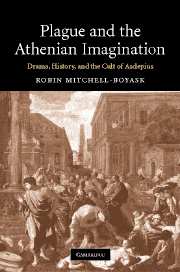Book contents
- Frontmatter
- Contents
- Preface
- Prologue
- Figure 1
- Chapter 1 Introduction
- Chapter 2 Death, myth and drama before the plague
- Chapter 3 Materials I: The language of disease in tragedy
- Chapter 4 Plague, cult and drama: Euripides' Hippolytus
- Chapter 5 Oedipus and the plague
- Chapter 6 The Trachiniae and the plague
- Chapter 7 Materials II: The cult of Asclepius and the Theater of Dionysus
- Chapter 8 Disease and stasis in Euripidean drama: Tragic pharmacology on the south slope of the Acropolis
- Chapter 9 The Athenian Asklepieion and the end of the Philoctetes
- Chapter 10 Conclusions and afterthoughts
- Works Cited
- Index
Chapter 6 - The Trachiniae and the plague
Published online by Cambridge University Press: 22 September 2009
- Frontmatter
- Contents
- Preface
- Prologue
- Figure 1
- Chapter 1 Introduction
- Chapter 2 Death, myth and drama before the plague
- Chapter 3 Materials I: The language of disease in tragedy
- Chapter 4 Plague, cult and drama: Euripides' Hippolytus
- Chapter 5 Oedipus and the plague
- Chapter 6 The Trachiniae and the plague
- Chapter 7 Materials II: The cult of Asclepius and the Theater of Dionysus
- Chapter 8 Disease and stasis in Euripidean drama: Tragic pharmacology on the south slope of the Acropolis
- Chapter 9 The Athenian Asklepieion and the end of the Philoctetes
- Chapter 10 Conclusions and afterthoughts
- Works Cited
- Index
Summary
“People who confidently claim to know the date of Sophocles' Electra or Trachiniae are living in a private world.”
H. Lloyd-JonesIn this chapter I explore the reasons for placing the composition and production of Sophocles' Trachiniae during the plague years and the implications of such a situation for understanding this tragic drama about the circumstances of the death of Heracles. Since the production of only two extant Sophoclean dramas, the Oedipus at Colonus, staged posthumously in 401 bce, and the Philoctetes of 409, can be fixed to definite years, most scholars generally rely on internal, stylistic, criteria to date the other five with some hope of accuracy. Yet studies of the Trachiniae on such grounds have been inconclusive, not least because they contradict one another. Moreover, this drama seems to lack completely any secure reference to external events, which thus enables a startlingly large range of possible dates; anywhere from 457 to 410 has been proposed at one time or another. It is, I suggest, at the very least a worthwhile intellectual enterprise to examine the reasons for accepting the later (though not the latest) part of this range and why Sophocles might have composed such a work during the 420s. But I also more fundamentally propose to change the way we ask this question: let us accept, for the moment, that Sophocles composed the Trachiniae sometime between 430 and 425, and then consider what would happen to our understanding of it in such a context.
- Type
- Chapter
- Information
- Plague and the Athenian ImaginationDrama, History, and the Cult of Asclepius, pp. 67 - 104Publisher: Cambridge University PressPrint publication year: 2007



